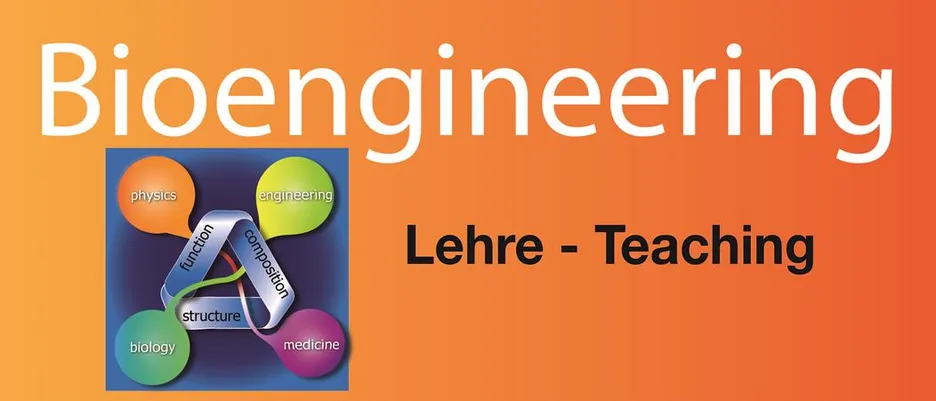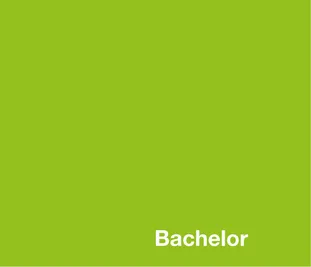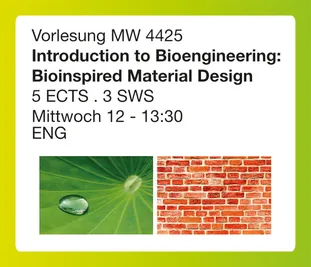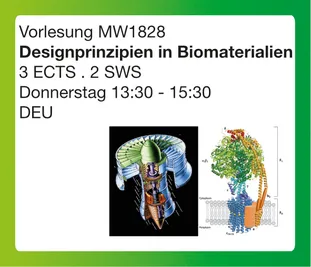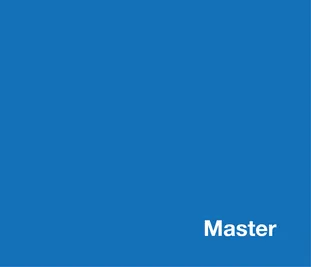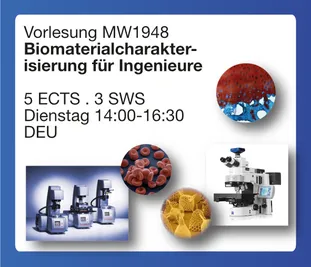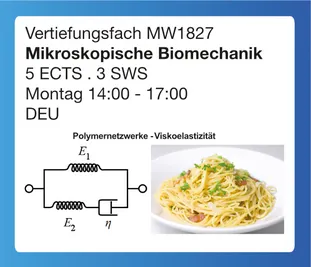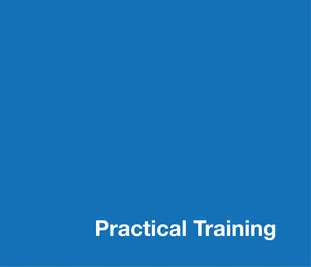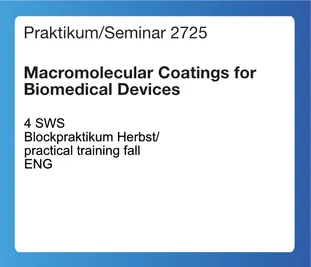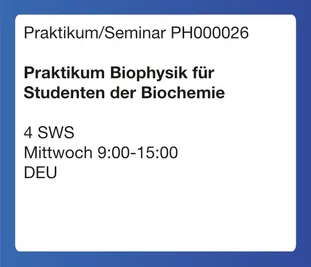Winter term 2024/25
| Course no. | Title | Dates | Duration | Type | Lecturer (assistant) |
|---|---|---|---|---|---|
| 0000000534 | Biomaterials |
|
2 | VO | |
| 0000MW1828 | Design Priciples in Biomatter - Nature as an Engineer |
|
2 | VO | |
| 0000MW1948 | Experimental techniques for the characterization of biomatter |
|
3 | VO | |
| 0000000406 | Instructions for independent scientific work |
|
1 | SE | |
| 0000002500 | Journal Club: Drug Delivery |
|
2 | SE | |
| 0000000026 | Lab course biophysics for students of biochemistry |
|
4 | PR | |
| 0000005072 | Macromolecular Coatings for Biomedical Devices |
|
4 | PR | |
| 0000MW1833 | Recent Progress in Biomechanics |
|
2 | SE |
Summer term 2025
| Course no. | Title | Dates | Duration | Type | Lecturer (assistant) |
|---|---|---|---|---|---|
| 0000MW1833 | Actual Topics of Biomechanics |
|
2 | SE | |
| 0000003006 | Instructions for independent scientific work |
|
1 | SE | |
| 0000004425 | Introduction to Bioengineering - Bio-inspired Material Design |
|
3 | VO | |
| 0000001343 | Journal Club: Drug Delivery |
|
2 | SE | |
| 0000002725 | Macromolecular Coatings for Biomedical Devices |
|
4 | PR | |
| 0000MW1827 | Microscopic Biomechanics |
|
3 | VO |
Microscopic Biomechanics SS
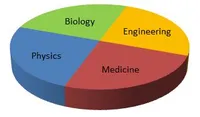
Volume: 2 SWS Lecture + 1 SWS tutorial
Credit points: 5
Lecturer: Prof. Dr. Oliver Lieleg
Content:
This lecture addresses micromechanical phenomena in bio-matter. First, the stability of chemical and physical bonds will be discussed. Then, the mechanical properties of single molecules and the application of the beam equation to biopolymers will be discussed. Further topics are the mechanism of force generation by molecular motors, e.g. for microscopic material transport or during the hearing process. The mechanical properties of biological membranes and biopolymer networks will be discussed and it will be demonstrated how nature achieves a broad spectrum of mechanical properties by fine-tuning the molecular composition of the material. Moreover, differences in the mechanical behavior of healthy and tumor cells will be highlighted and the reaction of single cells to external mechanical stimuli will be reviewed. Finally recent progress in the field of tissue engineering will be reviewed focusing on the generation of artificial cell/polymer communities.
Language: German
Place and time: lecture and tutorial: Monday, 14:00 - 17:00 conference room CPA 5415.EG006A
Target group: master mechanical engineering, master medical engineering, diploma mechanical engineering
Exam: oral or written
Characterization of Biomaterials for engineers WS
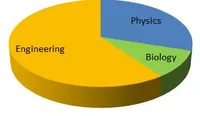
Volume: 3 SWS lecture
Credit points: 5
Lecturer: Prof. Dr. Oliver Lieleg
Content:
This lecture discusses experimental techniques that can be used to characterize the structure and mechanics of biomaterials. First, basic imaging techniques such as optical microscopy, electron microscopy, near field and atomic force microscopy will be introduced. It will be shown how these techniques can be adjusted to increase the resolution and contrast of the obtained images so that these techniques can be used for the characterization of biological samples. In a second part, macro- and microscopic techniques for determining the viscoelastic properties of biomaterials are reviewed and the corresponding setups are discussed. In a last part, techniques for micro- and nanostructuring are introduced and it is shown how they can be applied in tandem with optical or mechanical techniques in a microfluidic setup that allows performing complex sorting or analysis steps in a “lab on a chip” device.
Language: German/English
Place and time: Tuesday, 14 - 16:30, conference room CPA EG006A
Target group: master mechanical engineering (module numerical mechanics, module medical engineering), master medical engineering, diploma mechanical engineering
Exam: oral or written
Design Principles in Biomatter – Nature as an Engineer WS
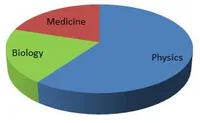
Volume: 2 SWS
Credit points: 3
Lecturer: Prof. Dr. Oliver Lieleg
Content: In this lecture, first the microstructure of biomaterials will be introduced. Using the biosynthesis of proteins, DNA-origami and virus replication as examples, self-assembly as a key principle in the design of biomaterials will be discussed. Diffusion as a key transport mechanism in bio-matter and mechanisms for its regulation will be reviewed. As one example, charge screening by counter ions will be highlighted. The microscopic design of selective permeability filters will be explained and how they are used by nature to establish and maintain gradients of e.g. ions or protons. The principles of signal transduction in neurons will be discussed – especially similarities to and differences from the charge transport in coaxial cables. Finally, the molecular principles used by nature to establish light absorption and conversion into chemical energy e.g. during photosynthesis will be discussed and key concepts of biomineralization processes will be presented.
Language: English
Place and time: Thursday, 13:30 – 15:30, lecture hall MIBE (prev. IMETUM)
Target group: bachelor/master mechanical engineering, master medical engineering
Exam: written
Introduction to Bioengineering: Bio-inspired Material Design SS
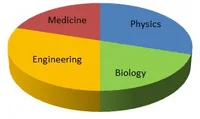
Volume: 3 SWS
Credit points: 5 ECTS
Lecturer: Prof. Dr. Oliver Lieleg
Content:
This lecture covers phenomena that take place on the surface of materials or at the interface between two materials. For example, the following topics are discussed: surface wetting resistance (superhydrophobicity), anti-adhesive surfaces, friction and lubrication by water-based lubricants, self-lubricating materials, the generation and prevention of wear, biological glues, anti-bacterial coatings, self-assembling and self-dissolving materials. For each topic covered by this lecture, a biological model is discussed, which shows how the particular material property can be achieved. Following this introduction of biological examples, artificial, (semi-) synthetic materials are discussed whose development was inspired by biological models. Examples of technical or medical applications of such bio-inspired materials include hydrophobic building materials (mortar, cement), water collecting devices from fog, molecular coatings for increased wearing comfort of contact lenses, and synthetic cartilage replacement materials and biologically inspired band-aids and wound-glues.
Language: English
Place and time: find in campus.tum.de
Target group: bachelor mechanical engineering
Exam: short talk and written final exam
Practical training: Biophysics für Students of Biochemics WS
Umfang: 4 SWS
Credit points:
Lecurers: Prof. Dr. Matthias Rief, Prof. Dr. Oliver Lieleg, PD Dr. Günther Woehlke and colleagues of Physics-Department
Content:
The practical training offers over the term one-day experiments with a wide range of topics and methods of biophysics.
Language: German
Place and time: Lab for Biopolymer Materials, CPA 5415.01.21 Wednesday 9:00 - 13:00, disposition of the groups on the first day in conference room CPA 5415.EG006A
Target group: Bachelor Studies Biochemics
Exam: The mark is a summary of preparation, performance, finishing of the protocol and a final seminar. Immanent exam.
Practical training: Macromedical Coatings for Medical Devices SS
Volume: 4 SWS
Lecurers: Prof. O. Lieleg, MSc. F. Henkel, MSc. M. Henkel
Content:
The lab course “Macromolecular Coatings for Biomedical Devices” focuses on the surface functionalization of biomedical devices. During three days of experimental work, the students will learn how to use biological macromolecules to coat artificial/technical surfaces. Furthermore, relevant properties of the coated surfaces such as hydrophilicity, lubricating properties, cell interaction and their ability to serve as a drug depot will be assessed.
Language: English
Time and place: 2 weeks in fall and/or 1 week in Spring (1 week per group), Lab for Biopolymer Materials, CPA 5415.01.21
Target group: M.Sc. Bioengineering, M.Sc. Biomedical Engineering, M.Sc. Biomedical Engineering and Medical Physics
Exam: The mark is a summary of preparation, performance, finishing of the protocol, and a final seminar. Immanent exam.
